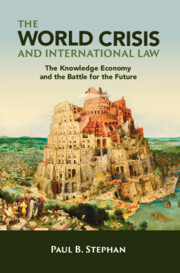Book contents
- The World Crisis and International Law
- The World Crisis and International Law
- Copyright page
- Dedication
- Contents
- Figures
- Preface
- Abbreviations
- 1 The Crisis Arrives
- Part I The Rise and Fall of Liberal Internationalism and the New World Order
- Part II The Knowledge Economy
- Part III Battlegrounds
- Part IV International Law Futures
- Index
1 - The Crisis Arrives
Published online by Cambridge University Press: 02 February 2023
- The World Crisis and International Law
- The World Crisis and International Law
- Copyright page
- Dedication
- Contents
- Figures
- Preface
- Abbreviations
- 1 The Crisis Arrives
- Part I The Rise and Fall of Liberal Internationalism and the New World Order
- Part II The Knowledge Economy
- Part III Battlegrounds
- Part IV International Law Futures
- Index
Summary
This chapter describes the various dimensions of the world crisis, how the crisis implicates international law, and how the knowledge economy has contributed to the crisis even as it accomplishes great wealth creation and technological mastery.
- Type
- Chapter
- Information
- The World Crisis and International LawThe Knowledge Economy and the Battle for the Future, pp. 1 - 18Publisher: Cambridge University PressPrint publication year: 2023



